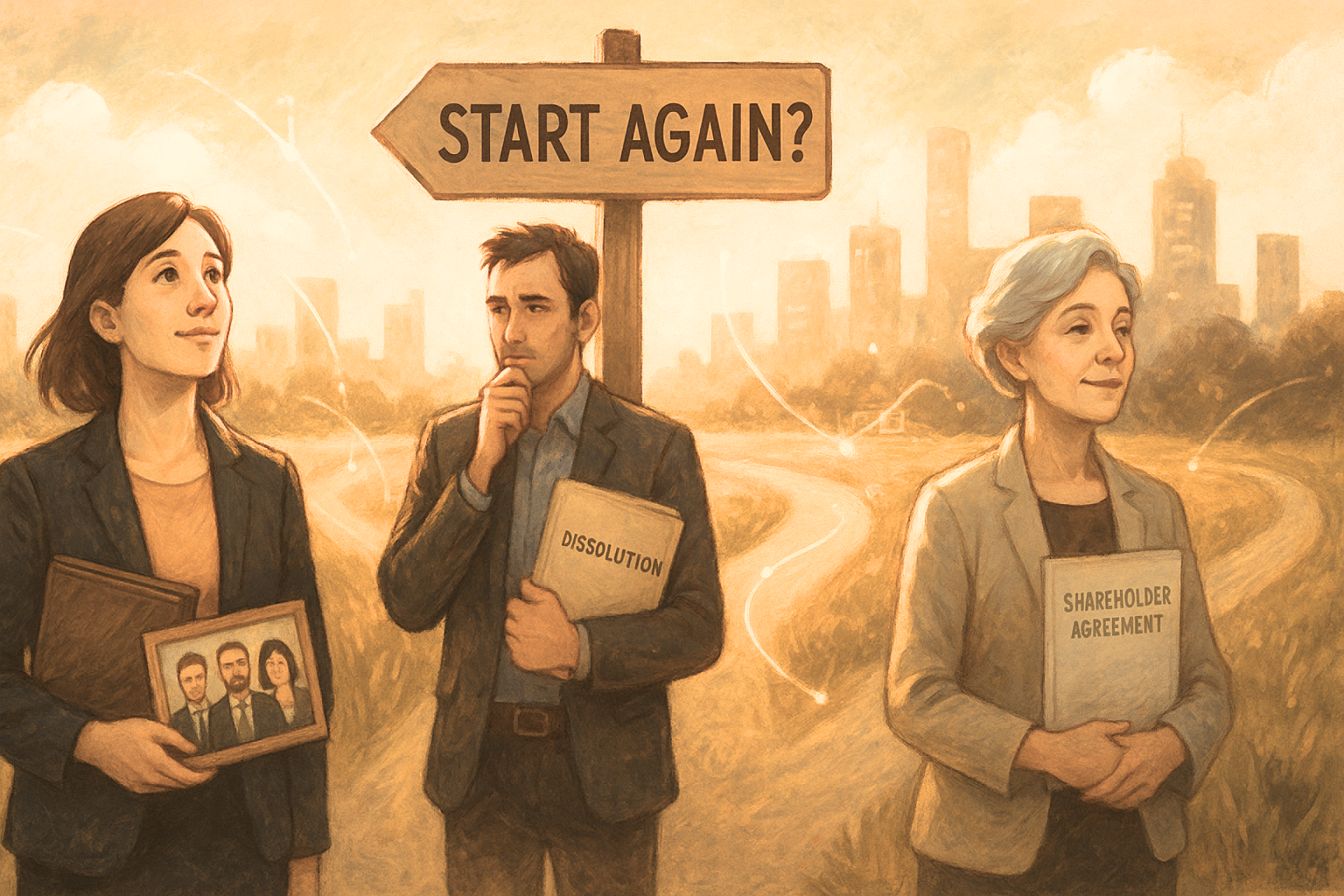Does Age Really Matter for Entrepreneurs?
Johannes Hagen, Lucia Naldi, Charlie Karlsson
Audio > Play / Stop
CeFEO's Authors
CeFEO counts more than 50 scholars and 30 affiliated researchers. Several studies and reports have consistently identified CeFEO as a leading research environment worldwide in the area of ownership and family business studies.
This research project, has been co-authored by the following CeFEO Members.
Reference
Spotlight highlights research-based findings only. If you’re interested in exploring this project further or delving into the theoretical and methodological details, we encourage you to contact the authors or read the full article for a comprehensive understanding.

Hagen, J., Naldi, L., & Karlsson, C. (2025). Aged to perfection? Unpacking the curvilinear relationship between founder age and new venture performance. Journal of Business Venturing Insights, 24, e00568.
https://doi.org/10.1016/j.jbvi.2025.e00568

What is Spotlight?
Spotlight is an innovative online family business magazine designed to bridge the gap between cutting-edge research and the real-world needs of practitioners, owners, and policymakers. Drawing on the latest findings from the Centre for Family Entrepreneurship and Ownership (CeFEO) at Jönköping International Business School, Spotlight delivers insightful, accessible summaries of key research topics. Our mission is to keep the family business community informed and empowered by offering actionable insights, expert analyses, and forward-thinking strategies that enhance business leadership and ownership practices for long-term success.

This article is brought to you by the WIFU Foundation
Spotlight is generously supported by the WIFU Foundation, which promotes research, education, and dialogue in the field of family business. This partnership enables us to continue bridging academic insights and real-world practice for the advancement of responsible family entrepreneurship and ownership.
When wisdom and financial freedom fuel entrepreneurship
New Swedish evidence challenges the popular idea that entrepreneurship is a young person’s game. Drawing on population-level data from 125,822 newly incorporated firms, the authors show that founder age relates to performance in an M-shaped way: survival improves with age up to mid-life, declines toward retirement, then briefly improves right after 65, before falling again later. Employment growth follows a simpler inverse U, peaking before retirement and plateauing afterward. The post-65 rebound in survival appears to reflect who chooses to start a business at that stage, individuals with pension income, strong industry experience, and higher education, rather than a universal late-life boost. The message is clear: life stage and financial security matter as much as age itself when predicting entrepreneurial success.
New Swedish evidence challenges the popular idea that entrepreneurship is a young person’s game. Drawing on population-level data from 125,822 newly incorporated firms, the authors show that founder age relates to performance in an M-shaped way: survival improves with age up to mid-life, declines toward retirement, then briefly improves right after 65, before falling again later. Employment growth follows a simpler inverse U, peaking before retirement and plateauing afterward. The post-65 rebound in survival appears to reflect who chooses to start a business at that stage, individuals with pension income, strong industry experience, and higher education, rather than a universal late-life boost. The message is clear: life stage and financial security matter as much as age itself when predicting entrepreneurial success.
Entrepreneurship is often portrayed as a young person’s pursuit, quick, agile, and full of energy. Yet, as the population ages, more people are founding ventures later in life. Many are drawn by purpose, flexibility, or the freedom that comes after leaving traditional employment.
But does age really help or hurt a startup’s performance? Is there an optimal window to found a business? This study provides one of the most comprehensive answers to date, using nationwide Swedish data to reveal how founder age affects both firm survival and growth, particularly around the retirement threshold.
What We Studied
The authors analyze all newly incorporated Swedish firms founded between 2011 and 2018, identifying 125,822 single-founder ventures and tracking 365,532 firm-year observations. They focus on truly new, closely held corporations by excluding large employers, mergers, and team-founded firms.
- Survival is examined using Cox proportional hazard models, where the key variable is age at founding.
- Employment growth is analyzed through fixed-effects regressions, where the founder’s age varies over time.
- Controls include gender, education, immigrant status, prior self-employment, and industry experience, alongside year and sector effects.
A critical feature of the study is its focus on the retirement window (ages 60–70). Using a regression discontinuity design (RDD), the authors exploit the age 65 threshold, the point when Swedes typically gain access to public pensions, to see how financial security changes who starts a firm and how those firms perform.
Key Insights
1) Survival follows an M-shaped pattern
Firm survival doesn’t simply decline with age. Instead, it follows an M-shape: strong improvement through the 20s to mid-40s, a decline toward the early 60s, a brief recovery just after 65, and a final drop in the late 60s.
In other words, turning 65 marks a small but distinct rebound in business survival, driven by a subset of founders who enter entrepreneurship under different circumstances than before retirement age.
2) Growth peaks earlier and plateaus at retirement
Employment growth follows an inverse U-shape, increasing steadily through mid-life before flattening around retirement. Unlike survival, there’s no rebound in growth after 65—founders tend to focus on stable, manageable ventures, not rapid expansion.
3) The post-65 bump reflects selection, not rejuvenation
Why do survival rates rise just after 65? The RDD results reveal that founders who start businesses at or after this age differ systematically from those just younger:
- Public pension claiming increases sharply—around 30 percentage points at age 65.
- Prior self-employment experience rises by 9.4 percentage points.
- Industry experience and college education also jump slightly.
These patterns suggest that late-life founders are more experienced, better educated, and financially secure, allowing them to weather early challenges.
4) Life stage outweighs chronological age
The findings show that resources and motivations tied to life stage—such as pension income, accumulated experience, and lower risk aversion—shape entrepreneurial outcomes more than age itself. In short: founders don’t age out; their circumstances change.
Takeaways
1) Time new ventures to align with life stage
Launching right after gaining pension access can improve survival odds. The financial buffer and freedom from employment constraints make post-retirement ventures more resilient, even if they stay small.
Practical advice:
- Use retirement income as a safety net during the startup phase.
- Focus on capital-light, experience-based businesses where credibility and networks matter more than speed.
2) Rethink growth expectations after 60
Older founders tend to prioritize stability over expansion. This isn’t a weakness; it reflects different goals and capacities.
Practical advice:
- Measure success through profitability, cash flow, or client retention, rather than job creation or rapid scaling.
- Consider lean models with fewer employees but higher productivity.
3) Leverage experience, not endurance
The data highlight that late-career entrepreneurs bring valuable expertise and networks. Their edge lies in judgment, reputation, and industry knowledge, not long working hours or aggressive scaling.
Practical advice:
- Position late-life ventures in fields where experience and trust are decisive advantages (e.g., consulting, craft, professional services).
- Partner with younger professionals for energy and tech fluency, creating balanced teams.
4) Anticipate financing challenges, and design around them
Research suggests older founders face bias from external investors. The pension-linked survival advantage shows that self-financing capacity can offset this barrier.
Practical advice:
- Start small with pilot customers or pre-orders before seeking capital.
- Use revenue-sharing or royalty models that reward steady returns over explosive growth.
5) Distinguish opportunity-driven from necessity-driven ventures
After age 67, survival declines again, likely because some individuals start firms out of economic necessity rather than opportunity. Sustainable late-life entrepreneurship comes from choice and capability, not compulsion.
Practical advice:
- Assess readiness through experience, market demand, and financial stability before launching.
- If the foundation is weak, consider partnerships or advisory roles instead of solo founding.
Impact
This research reshapes the narrative about entrepreneurship and aging. Rather than viewing age as a disadvantage, it highlights how life-stage transitions, especially access to pensions and accumulated expertise, can redefine entrepreneurial success.
For policymakers, this suggests value in encouraging post-retirement entrepreneurship through flexible pension schemes and training. For investors and incubators, it calls for rethinking bias toward older founders.
Strategically, the findings affirm that entrepreneurial potential spans the entire life course, but what success looks like evolves with time. Younger founders may drive growth; older ones may optimize for endurance, quality, and personal fulfillment.
Recommendations
- Launch ventures at the right life stage, not the “right age.” Consider the role of financial security and experience when timing a startup.
- Set realistic performance metrics. Focus on resilience, profitability, and longevity rather than headcount growth.
- Build mixed-age teams. Combine seasoned judgment with younger collaborators who bring fresh skills.
- Plan for financial independence. Leverage pensions, savings, or alternative funding models to minimize investor bias.
- Encourage opportunity-driven ventures. Support later-life entrepreneurship as a proactive choice, not a fallback.

CeFEO's Authors
CeFEO counts more than 50 scholars and 30 affiliated researchers. Several studies and reports have consistently identified CeFEO as a leading research environment worldwide in the area of ownership and family business studies. This research project, has been co-authored by the following CeFEO Members.
Reference
Spotlight highlights research-based findings only. If you’re interested in exploring this project further or delving into the theoretical and methodological details, we encourage you to contact the authors or read the full article for a comprehensive understanding.

Hagen, J., Naldi, L., & Karlsson, C. (2025). Aged to perfection? Unpacking the curvilinear relationship between founder age and new venture performance. Journal of Business Venturing Insights, 24, e00568.
https://doi.org/10.1016/j.jbvi.2025.e00568

What is Spotlight?
Spotlight is an innovative, AI-powered, online family business magazine designed to bridge the gap between cutting-edge research and the real-world needs of practitioners, owners, and policymakers. Drawing on the latest findings from the Centre for Family Entrepreneurship and Ownership (CeFEO) at Jönköping International Business School, Spotlight delivers insightful, accessible summaries of key research topics. Our mission is to keep the family business community informed and empowered by offering actionable insights, expert analyses, and forward-thinking strategies that enhance business leadership and ownership practices for long-term success.

This article is brought to you by the WIFU Foundation
Spotlight is generously supported by the WIFU Foundation, which promotes research, education, and dialogue in the field of family business. This partnership enables us to continue bridging academic insights and real-world practice for the advancement of responsible family entrepreneurship and ownership.










